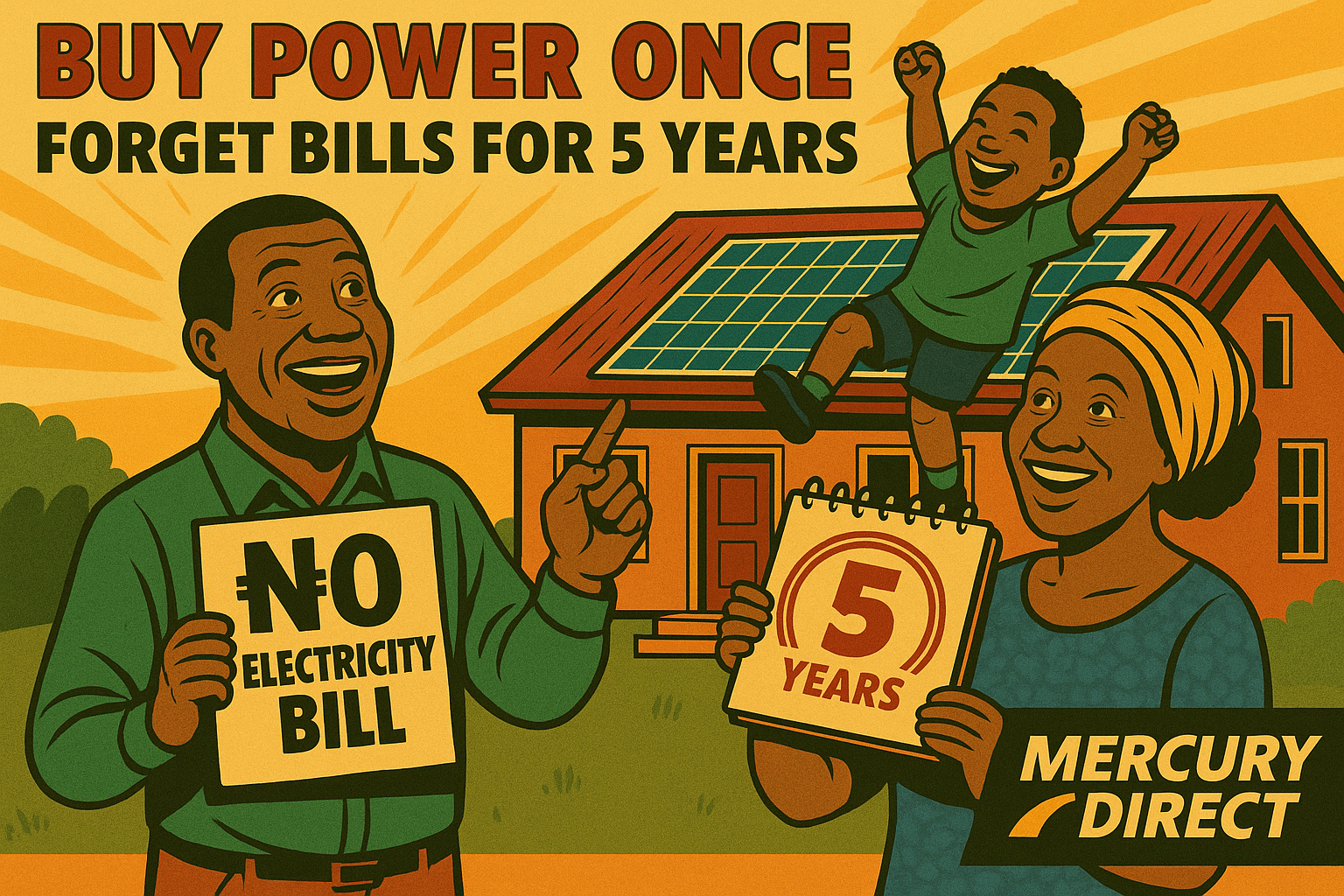Buy Power Once, Forget Bills for 5 Years
In Nigeria, electricity is no longer a convenience—it’s a crisis. From unreliable NEPA supply to skyrocketing generator fuel costs, millions of Nigerians face a monthly nightmare just to keep the lights on. But a growing number of smart homeowners and business owners are opting out of this broken system entirely. They’re choosing to Buy Power Once and Forget Bills for 5 Years.
The Rising Cost of Electricity in Nigeria
As of 2025, electricity tariffs have soared. Band A customers now pay ~₦225 per kilowatt-hour (kWh), up significantly from previous years, all for the promise of at least 20 hours of electricity daily (AbujaRealEstate.ng). Unfortunately, for many, the reality falls short.
According to Nairametrics, the average Nigerian household experiences 6 to 7 blackouts per week, each lasting 10–12 hours. And the National Bureau of Statistics reports that 85.2% of homes are still on estimated billing, meaning they often pay for power they never actually receive.
So what are people doing to survive? Generators. But that comes at an even steeper price.
The Hidden Cost of Generator Dependency
Generators seem like a solution until you do the math:
- ₦120,000 to ₦200,000/month in petrol or diesel
- ₦100,000+ per year in maintenance
- Endless noise and toxic fumes
The cost per kWh from a diesel generator is around $0.95 (almost 2x the national grid) according to PV KnowHow. And that’s before considering the 1,500+ deaths annually from generator-related carbon monoxide poisoning and fire incidents.
Solar Energy: A Sustainable and Cost-Effective Alternative
With over 350 sunny days per year, Nigeria is perfectly positioned for solar energy. And Nigerians are waking up to the benefits. In 2024 alone, 73MW of solar capacity was added, bringing the total to 438MW — a 20% jump (PV KnowHow).
The cost of solar continues to fall. The levelized cost per kWh from a quality solar + battery system is now $0.38–$0.47, cheaper than both NEPA and diesel.
But the real breakthrough? Lithium batteries.
Why Lithium Batteries Are the Real Game Changer (And How They Compare to Others)
When investing in solar, your battery matters just as much as your panels. Today, lithium iron phosphate (LiFePO4) batteries are revolutionising solar reliability and longevity in Nigeria.
Why Nigerians Are Choosing Lithium:
- ✅ 5-Year Warranty — trusted protection for peace of mind
- ✅ 10-Year Lifespan — double that of many older battery types
- ✅ Faster charging and deeper discharge — more usable power every day
- ✅ Maintenance-free — no water top-up, no corrosion
- ✅ Compact & clean — ideal for modern homes and businesses
With a properly sized lithium battery system, many customers enjoy up to 24 hours of uninterrupted power without relying on NEPA or a generator.
But What About GEL and Tubular Batteries?
Not everyone needs lithium, and not every budget allows for it. That’s why GEL and Tubular batteries still play a vital role:
- ✅ GEL batteries are ideal for light-to-medium users on a budget.
- ✅ Tubular batteries are designed for deeper cycles and heavier loads.
With professional installation, many Mercury Direct customers enjoy 3–4 years of reliable performance from these battery types. They’re still cost-effective and dependable for most Nigerian households.
Which One Should You Choose?
- 🔹 GEL: Best for basic backup needs (lights, fans, TV)
- 🔹 Tubular: Mid-range power users with moderate budgets
- 🔹 Lithium: Premium performance and lowest cost over 10 years
Mercury Direct offers all three, helping you choose what works best for your home, budget, and goals.
Real-Life Success Stories
Nigerians from all walks of life are making the switch:
“We switched to solar and inverter last year. Zero blackouts. Zero fuel runs. Can’t imagine life without it now.” — Reddit user, Lagos
“With solar, our barbershop now opens earlier, closes later, and we save over ₦100k a month on fuel.” — Small business owner, Benin
“Doctors Without Borders now rely on solar to store medicine safely during outages. It’s been a game-changer for us.” — Field coordinator, Abuja
Government Support and Policies
Nigeria’s Renewable Energy Master Plan aims to grow renewable energy’s share of electricity to 23% by 2025 (IEA). New incentives, tax reliefs, and import duty reductions are making it easier than ever to go solar.
And with private sector growth and solutions like battery trade-in programs, access is becoming broader.
Addressing Common Concerns
Q: Isn’t solar expensive?
A: It used to be. Today, you can get a full solar system starting from just over ₦1 million. And with monthly NEPA + fuel costs now exceeding ₦120,000 in many homes, solar pays for itself in 2–4 years.
Q: What if there’s no sun?
A: Lithium batteries store excess power, so you enjoy round-the-clock electricity even on cloudy days.
Q: What about maintenance?
A: GEL and Tubular batteries require minimal upkeep. Lithium systems are virtually maintenance-free.
Ready to Buy Power Once and Forget Bills for 5 Years?
The numbers are clear. The savings are real. The peace of mind is priceless.
You don’t have to keep paying NEPA and fuelling a noisy generator every month. You don’t have to wait for the grid to improve. With solar and the right battery, you can own your power today.
Even if you’ve already gone solar, share this with someone you care about who’s still stuck in the loop of darkness, diesel, and disappointment.
🔥 Take the First Step Toward Energy Freedom
Visit 👉 mercurydirect.com.ng
Or message us now on WhatsApp 👉 07037451701
Let us help you build a custom solar system that fits your needs, your budget — and your future.

